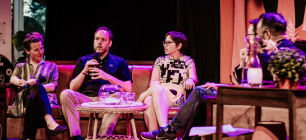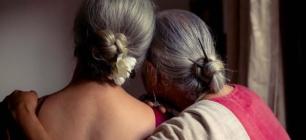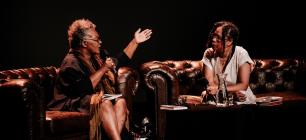
Poetry & Therapy
We’ve all cried at a Mary Oliver poem and felt the soothing effects poetry can have on the brain: reading a poem can make you feel understood, closer to home. This program is a panel discussion about the therapeutic value that poetry may or may not have, and if poetry can be used as a form of therapy. During this conversation, we will explore whether we can speak of a change in the way we look at poetry: are people more interested in the therapeutic value of poems? And how do poets relate to this?
Samira Negrouche is an Algerian essayist, translator and poet. She is part of a movement of Algerian writers who reclaim the French language by writing in, through and against the tradition. This stance is also reflected in her works of translation, where she translates from Arabic and regional minority languages into English and French, giving an internationally intelligible voice to the cultural, historical and linguistic plurality of the Arab world. Next to explicitly political poet...
We’ve all cried at a Mary Oliver poem and felt the soothing effects poetry can have on the brain: reading a poem can make you feel understood, closer to home. This program is a panel discussion about the therapeutic value that poetry may or may not have, and if poetry can be used as a form of therapy. During this conversation, we will explore whether we can speak of a change in the way we look at poetry: are people more interested in the therapeutic value of poems? And how do poets relate to this?
Samira Negrouche is an Algerian essayist, translator and poet. She is part of a movement of Algerian writers who reclaim the French language by writing in, through and against the tradition. This stance is also reflected in her works of translation, where she translates from Arabic and regional minority languages into English and French, giving an internationally intelligible voice to the cultural, historical and linguistic plurality of the Arab world. Next to explicitly political poetry about the Arab spring and the violence in her country, Negrouche also writes poems that are inspired by divers visual images and the products of other artistic disciplines, such as theater, photography, music and dance. As one of the leading contemporary Algerian poets, Negrouche is often invited to national and international events, where she reads her own poetry or collaborates with other artists to create interdisciplinary works. Next to having written several books of poetry, she has edited Quand l’amandier refleurira (2012) an anthology of francophone Algerian poets. In 2004, she received a scholarship including a residence from the Centre national du livre. Her poetry has been in translated into twenty-five languages, such as Spanish, Arabic, Bulgarian and Greek among others. Additionally, she serves as the secretary of the Algeria PEN club and is the creator of CADMOS a cultural association for the preservation of Mediterranean cultural heritage.
Rachel Rumai Diaz is a writer, poet, performance artist and programmer. She is also founder of the feminist literary festival Zus en Zo, a platform that focuses on intersectionality and modern sisterhood. Rachel is a workshop teacher, mentor and cultural coach, teaching in high schools, to MBO students and in various museums throughout the Netherlands. From spoken word and poetry to creative writing, her goal is to introduce youth and young adults to word art in a non-traditional way.
Saturday June 8th
21.00 - 21.45
LantarenVenster - Foyer
Pricing
This program is freely accessible as part of our LantarenVenster foyer program.
Language and duration
Language: English
Duration: 45 minutes
Festival poets
Sponsors


















